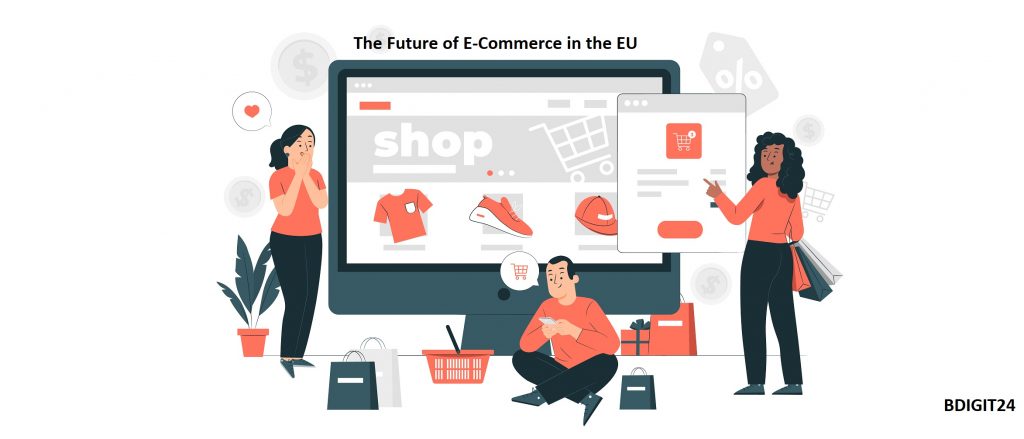Adapting to a Dynamic Digital Marketplace in 2025
The European e-commerce landscape is undergoing significant transformation, influenced by evolving consumer behaviours, regulatory frameworks, and innovative growth strategies. As of 2023, approximately 75% of EU internet users aged 16 to 74 engaged in online shopping, marking a substantial increase from 53% in 2010.
Conseil de l’Union européenne This upward trend underscores the critical importance for businesses to adapt to the dynamic digital marketplace.
Emerging Trends in EU E-Commerce
- Sustainability and Eco-Friendly Practices European consumers are increasingly prioritising sustainability in their purchasing decisions. This shift has prompted e-commerce platforms to adopt eco-friendly practices, such as reusable packaging and carbon-neutral delivery options. For instance, Austria plans to introduce a deposit system for beverage packaging in 2025, reflecting a broader commitment to environmental responsibility. Ecommerce Germany
- Mobile Commerce (M-Commerce) Expansion The proliferation of smartphones has led to a surge in mobile commerce across Europe. Consumers are increasingly using mobile devices for browsing and purchasing, prompting businesses to optimise their platforms for mobile responsiveness and user-friendly interfaces.
- Artificial Intelligence (AI) and Personalisation AI technologies are revolutionising the e-commerce sector by enabling personalised shopping experiences. Through AI-driven product recommendations and tailored marketing strategies, businesses can enhance customer engagement and satisfaction, leading to increased conversion rates. Aqurate
- Omnichannel Retailing The integration of online and offline channels has become a key strategy for retailers aiming to provide seamless shopping experiences. By offering services such as click-and-collect and unified customer service, businesses can cater to diverse consumer preferences and enhance brand loyalty.
Regulatory Developments Shaping the Market
The European Union has implemented several regulations to ensure a fair and competitive e-commerce environment:
- Digital Services Act (DSA) and Digital Markets Act (DMA): Introduced in December 2020, these acts aim to create a safer digital space by protecting users’ fundamental rights and establishing a level playing field for businesses. The DSA focuses on consumer protection, while the DMA addresses competition issues related to large online platforms, known as “gatekeepers.” Wikipédia
- Enhanced Customs Controls: In response to the influx of low-cost products from non-EU e-commerce platforms like Temu and Shein, the EU plans to tighten customs checks. This initiative seeks to ensure product safety and fair competition, addressing concerns about unregulated imports and counterfeit goods. The Guardian
Strategies for Sustainable Growth
To thrive in the evolving EU e-commerce landscape, businesses should consider the following strategies:
- Investing in Digital Transformation Embracing digital technologies is crucial for competitiveness. The EU aims for over 90% of SMEs to achieve at least a basic level of digital intensity by 2030, with 75% of companies utilising cloud computing, big data analysis, or AI. Union Européenne
- Prioritising Data Privacy and Security With increasing concerns about data breaches, businesses must ensure robust data protection measures. Compliance with regulations like the General Data Protection Regulation (GDPR) is essential to maintain consumer trust and avoid legal penalties.
- Enhancing Customer Experience Providing exceptional customer service, easy navigation, and efficient delivery options can significantly improve customer satisfaction. Personalised experiences, facilitated by AI, can also foster loyalty and repeat business.
- Adopting Sustainable Practices Implementing eco-friendly initiatives, such as sustainable packaging and carbon-neutral shipping, can attract environmentally conscious consumers and differentiate a brand in a competitive market.
- Leveraging Social Commerce Utilising social media platforms for direct sales can expand reach and engage consumers in interactive ways. Features like shoppable posts and live-stream shopping events cater to the growing trend of social commerce.
The future of e-commerce in the EU is poised for continued growth, driven by technological advancements, regulatory frameworks, and evolving consumer preferences. By staying attuned to emerging trends and proactively adapting strategies, businesses can capitalise on opportunities and navigate challenges in this dynamic digital landscape.
EcommerceEU #DigitalTransformation #SustainableBusiness #AIinRetail #Omnichannel

